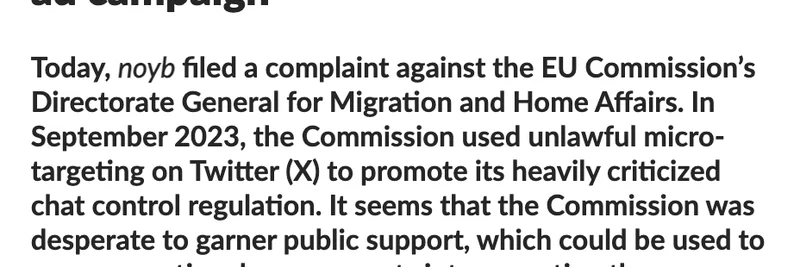In the ever-evolving world of cryptocurrency, privacy is becoming a hot-button issue, especially with governments pushing for more control over digital communications and finances. A recent tweet from Mert, CEO of Helius Labs, perfectly captures this tension, calling Europe a "walking Zcash advertisement." Let's dive into what this means and why it's buzzing in the crypto community.
The tweet quotes a post from @levelsio, highlighting how the European Commission allegedly bought targeted ads to promote its ChatControl bill—something that's reportedly illegal. ChatControl, for those unfamiliar, is an EU proposal aimed at scanning private messages on platforms like WhatsApp or Signal to detect child sexual abuse material. While the intent sounds noble, critics argue it opens the door to mass surveillance, undermining end-to-end encryption and personal privacy.
Mert's take? Europe's moves toward Central Bank Digital Currencies (CBDCs), chat monitoring, and even "spending allowances" (think programmable money where governments can dictate how you spend) are essentially free marketing for privacy-focused coins like Zcash. He warns: "if you don't have money stashed away in a shielded pool, I have bad news for you." Shielded pools in Zcash use zero-knowledge proofs—fancy tech that lets you prove a transaction is valid without revealing details like amounts or addresses—to keep your finances private.
This isn't just abstract talk. In the meme token world, where fast trades and community-driven hype rule, privacy matters more than ever. Imagine trading your favorite dog-themed coin without Big Brother watching every move. Regulations like ChatControl could force platforms to log and report suspicious activities, potentially chilling the freewheeling spirit of meme coins. Zcash, with its optional privacy features, offers a shield against that, allowing users to opt into full anonymity when needed.
The thread sparked reactions from the community, with users pointing out past incidents like Canadian authorities freezing bank accounts of crypto donors during protests. Others joked about Zcash's rising appeal, predicting price pumps to $200. Even Monero fans chimed in, debating the best privacy coins. It's clear: as governments tighten the screws, demand for tools like Zcash—originally forked from Bitcoin with added privacy layers—could skyrocket.
For blockchain practitioners and meme token hunters alike, this serves as a reminder to diversify into privacy assets. Whether you're dodging CBDC controls or just valuing your financial freedom, Zcash's tech provides a robust alternative. Keep an eye on EU developments; they might just propel the next big wave in crypto privacy.
If you're deep into meme tokens, consider how privacy features could integrate into future projects. Tools like shielded transactions aren't just for serious finance—they could protect your gains in the wild world of pumps and dumps. Stay informed, stay private, and as always, DYOR (do your own research).


